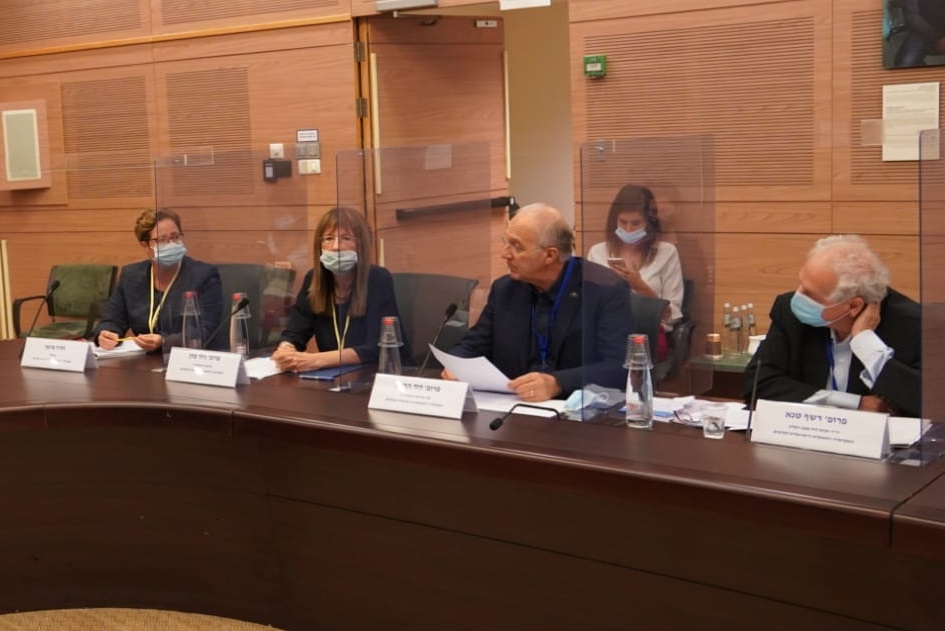On November 10, 2020, the Knesset Committee on Science and Technology, chaired by MK Einav Kabala, devoted a session to the presentation of the third triennial Report on the State of the Sciences in Israel – 2019, published by The Israel Academy of Sciences and Humanities.
MK Einav Kabala, Chair of the Knesset Committee on Science and Technology: “The world has expressed great confidence in Israeli science, and that confidence ought also to come to expression on the part of Israel’s decision-makers, in the form of commensurate investment and granting of the necessary resources.”
The purpose of the Report is to convey an up-to-date picture of the state of science and research in Israel and to pose new goals and challenges to be met in the coming years. The committee appointed by the Israel Academy to prepare the report comprised members of the Israel Academy and of the Israel Young Academy, headed by Prof. Reshef Tenne.
Prof. Nili Cohen, President of the Israel Academy of Sciences and Humanities, declared:
The Israel Academy hopes decision-makers will be responsive to the recommendations of the Report on the State of the Sciences and pursue their implementation – among other things, by way of appropriate budgeting – so as to ensure the robust status of science and research in Israel. The difficult times we are currently experiencing demonstrate once more the need to invest resources in the scientific fields and, equally, the need to preserve freedom of action in the academic world, which is a condition for the thriving of groundbreaking research that not only advances our knowledge about the world, but also enhances our prosperity and that of the entire world.
Prof. Tenne stated during the session:
Investment in basic research in Israel is insufficient. Israel’s scientific outputs set it among the world’s advanced countries. By virtue of Israel’s prodigious human capital, we have been able partially to overcome the big gap in resources for basic research. Israel’s scientific achievements are expressed in a broad range of fields and parameters.
Discussion of the third triennial Report on the State of the Sciences in Israel – 2019 held in the Knesset Committee on Science and Technology (Photo by Danny Shem Tov, Courtesy of the Knesset spokesperson office)
Prof. David Harel, Vice President of the Israel Academy, summarized the Academy’s activities in response to the COVID-19 crisis and expanded upon the subject of the importance of biomedical research, as it arises from the Academy’s Reports. On this subject, Prof. Daniel Zajfman chairman of the Council of the Israel Science Foundation remarked: “One of the great scientific revolutions of the last decade has been in the biomedical field.” He added: Although Israel has a very good medical system, mainly because of the quality of its doctors, and academic biomedical basic research of excellent quality, mainly by virtue of the quality of the scientists in the universities, there is almost no connection between the two: There is practically no participation in research by physician-researchers working in the hospitals. He remarked further that a comprehensive program for supporting joint research by physician-researchers and academic researchers ought to be at the top of the strategic agenda for scientific research in Israel. Prof. Zajfman concluded by announcing: “The Israel Science Foundation is working to develop a support program in this field, and we hope that it will soon become part of the research scene in Israel.” Israel Academy Member Prof. Eli Keshet, one of the authors of the Report, emphasized that the enormous changes that have occurred in medical research are opening up exciting new medical possibilities, and they demand a new multi-disciplinary order of business. This initiative ought to include efficient utilization of the large potential inherent in physician-researchers and the cooptation of researchers from additional fields of knowledge, such as data analysis and engineering. He remarked further that the Israel Academy is working to promote biomedical research in these directions as well. Prof. David Harel added that he “is pleased by the cooperation between the Science and Technology Committee, the Ministry of Science and Technology, the Planning and Budgeting Committee of the Council for Higher Education, the Israel Science Foundation and all the bodies involved in supporting medical and biomedical research.”

In the photo (from the left): Galia Finzi, Israel Academy Director, Prof. Nili Cohen, President of the Israel Academy, Prof. David Harel, Vice President of the Israel Academy and Prof. Reshef Tenne, Academy Member and head of the State of the Science Report committee, during Knesset discussion (Photo by Danny Shem Tov, Courtesy of the Knesset spokesperson office)
The discussion of the Report also touched upon subjects connected with the humanities and the social sciences. Israel Academy Member Prof. Israel Bartal, a member of the Report committee, spoke of the vital importance of humanities and social science research to the nurturing of excellence and the encouragement of innovative research in all of the scholarly disciplines. He offered some pointed recommendations regarding projects intended to encourage interfaces between theoretical and experimental science, programs for supporting research, and strengthening the infrastructure for the optimal training of the next generation of scholars in the humanities and the social sciences.